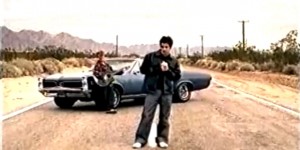Louise Burns is cool with being a young mope
by Luke Ottenhof
February 8, 2017
On her last album, a negative review called BC singer-songwriter Louise Burns a young mope. On her new album, she's taken that title and turned it into a positive.
Photo: Jennilee Marigomen
—
“I see Wednesday as green,” Louise Burns tells me over the phone from Vancouver, three time zones away, on a Wednesday. “You might see it as orange or blue.”
She’s describing her experience with synesthesia, which produces an involuntary sensory or cognitive experience in conjunction with another sensory or cognitive experience. For Burns, this means she associates and sees colours triggered by other things, like music or words. “Every time I make a record, I have a palette in mind, and it keeps my focus. It sort of provides a border for me.” The synesthetic version of colouring inside the lines.
“It’s more fun to talk about when you’re stoned,” she laughs.
But Burns’ new record, Young Mopes, released February 3, is anything but what you would normally associate with ‘colouring inside the lines.’ It’s sporadic, surprising, and untethered from genre or classification. It could be squarely and fairly couched in the ‘alternative’ category, but who wants to use that term anymore?
Burns’ dodging of categorization might seem ironic given that her record is named after a reductive label applied to her music in a review a couple years prior. “I feel like I’ve broken some code in ‘music person’ land. Like, ‘it’s not cool to read your reviews and comment on them!’ But I just thought it was so accurate. That’s totally what I am, I’m just such a fucking mope,” she laughs.
But it’s more than just that; it’s a repurposing of the term, a reclamation of sorts. It’s taking a confining idea and applying it to a set of gorgeous, expansive, glowing songs stretching from everyone’s favourite Burns tagline “gothic pop,” to Americana, to “The Peak” sound (a term used to denote a uniquely ‘Vancouver’ modern alternative rock sound), to pearly electro, and more.
It’s telling that so many tags have to be mentioned; it’s not a record that subscribes to a playbook, and it’s not a record that’s trying to be trendy (a fact that makes it all the more endearing and impactful). “It’s sort of hard to make yourself be honest with your writing and not have these outside influences in order to sound trendy, or to sort of get in with what’s hot right now so you’ll have more opportunities,” Burns asserts. “I hate that stuff.”
The last record she made, 2013’s The Midnight Mass, was a marked expansion of 2011’s Mellow Drama, as Burns describes “getting really wrapped up in modernization of my sound. The first record was so old school in the way I approached it.” Young Mopes seems to be a continued, immense diversification of a sonic portfolio that refuses to be pigeonholed. It’s the sound of a capital-g Genuine artist.
“I just wanted to not have any ulterior motives. I just wanted to have fun with it, and do it as naturally and honestly as I could. You know, your back brain is like, ‘it’s not cool to be indie rock right now.’ I just shut it out and did whatever I wanted, and it was so much more fun.” A qualifying laugh confirms.
Despite being just over 30, Burns has been in this industry for two decades, going through the motions of the music industry a little earlier than most; she co-founded pop-rock group Lillix in her hometown of Cranbrook, BC, a band that went on to sign with Madonna’s ill-fated Maverick Records, and even did a stretch of Warped Tour. 20 years in the industry at Burns’ level is a sort of longevity that isn’t altogether common or easy. That kind of time comes with some serious reflection, and not without its’ moments of doubt.
“I’ve been really lucky in the sense that I got to spend my 20s doing what I thought I should be doing,” she says. “Not necessarily playing to sold-out crowds, but I was getting show opportunities in Asia and the UK. I burnt myself out, but that’s what you do in your 20s. As I approached 30, I [was] like, ‘Do I want to keep doing this? Is this the lifestyle for me?’ I broke my hip towards the end of my 20s onstage. It was this weird thing of, ‘Is my body telling me to stop doing this?’
“I’m sort of tunnel vision[ed] when it comes to music and playing, so that was a reminder of, ‘Oh ya, I guess I am a mortal human being.’ So making this record was definitely quite reflective for me.”
Burns’ career is iconic by virtue of her stellar output alone. That’s an indisputable fact. And it’s tiresome and exhausting (not to mention unfair) for women to have to discuss the fact that, yes, they are a successful woman in the music industry. But when female artists are still being systematically subjugated and bootstrapped by not just men but the whole industry, the issue still needs to be part of our discourse. It’s part of working towards a place where it doesn’t have to be part of our discussion.
“I think there’s a shift that happens sometimes. I guess as you grow older, for me at least, I decided, ‘there’s nothing better than being a woman.’ I couldn’t imagine not being a woman in music,” she affirms. “It’s tough, you gotta put up with a lot of bullshit that shouldn’t happen. But I’d rather be a woman in music than anything else, because it IS empowering. It’s a male-dominated world, and the more of us there are, the better chance we have to change that gender gap.”
Like many others, Burns sees music as a venue to destroy that gap. “Music should be the one unifying thing that brings us all past that. ‘Female musician,’ ‘girl guitar player.’ It’s just like, duh?” She’s optimistic, though, and patient. “You’re not inherently born with all this knowledge,” she reiterates.
It’s understandably easy to get jaded and cynical about playing music. That rabbit hole has claimed many, and with good reason (remember Steve Miller saying the industry “fucking sucks”? He wasn’t just grumbling; he was pissed about gender disparity). It’s sometimes difficult to see the tangible results of your work as a musician. Conviction and confidence in your success as an artist aren’t easily come by. Burns had to be reminded of those things.
“A fan reached out to me after going through some really heavy stuff and said, ‘I just want you to know, I know you don’t take yourself seriously all the time, but I do, and your music got me through something pretty intense,’” Burns recalls, contemplative and quiet. “I got this message and was sort of having this crazy breakdown almost, of like fear and regret and all sorts of crazy life choices flashing before me. It took something that crazy to remind me that what I’m doing is what I’m meant to be doing.”
“Musicians, we’re not saving lives. We’re just playing music and being selfish and having these stupid problems we create for ourselves,” she chuckles, thrusting the applicability of Young Mopes into full view. “If some people are listening and responding to it in a way that’s meaningful, it sort of just makes me feel less… useless.”
Tags: Music, Featured, Interviews, Lillix, Louise Burns





